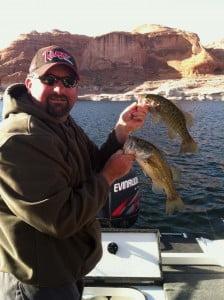Photo: Sean Pond, Denver CO, shows off
some smallmouth bass caught on hula grubs in Lake Powell’s San Juan arm. Bass
fishing is great lake wide and will continue to excel well into October while
water temperate is on the 60s.
Lake levels at #lakepowell are holding steady for the past week
which means it is still possible to launch at Antelope Point public launch ramp
on the southern end of the lake. Launching is hindered by low water
levels but still possible at Bullfrog, Halls, Stateline and Wahweap Main ramps.
Just take a little extra time and use caution when launching at any ramp at
these low levels. Look before you launch.
The first day of Fall for #lakepowellfishing brought a wind storm that stirred the lake, mixing the
warm water with cooler layers below. The result was the first major temperature
drop of the season. Lake surface temperature declined from 77 to 73
degrees in one day. The ideal fishing temperature both spring and fall is
the mid 60s which will probably be reached during the first two weeks of
October.
Best fishing now is offered by smallmouth bass that seem to be present on all
rocky points over the length of the lake. The best strategy is to move
from point to point casting plastic grubs, tubes and dropshot worms. Work the
plastic baits down the rocky point from the shoreline to a depth of 30 feet.
Little bass are really active but bigger fish to 2-pounds may be found in the
deeper water. Dropping surface temperature will allow bigger bass to come
closer to the surface in the near future.
Not to be outdone, stripers are still hungry and agreeable in deep water over
the length of the lake. Graph long points, canyon mouths, and steep walls where
a sloping outcropping or shelf appears near a depth of 30 feet. In the
southern lake these striper schools react better if chummed into activity with
anchovies. In the northern lake bait is not needed as shad are more common.
Spooning from 30-60 feet where striper schools are graphed is the best
technique now and huge numbers of stripers are waiting to be caught. Drop the
spoon to the bottom and jig it a few times. Then “speed reel” toward the
surface to show stripers a fleeing fish. It is hard for them to resist this
escape behavior. When the school is activated off the bottom speed reeling is
almost a sure thing.
Deep downrigger trolling is successful with shad imitating lures at depths
greater than 40 ft. Night fishing under lights is working well near the
marinas.
Shad are hiding in warm thermal refuges. At Deep Canyon last week the
recent storms had cleared the streambed of sediment and deposited a shallow
layer of sand where stream meets lake. A large school of adult threadfin shad
were hiding on top of that sediment flat at the back of the canyon. Adult
stripers were a few hundred yards away but separated by 30 feet of warm water.
That horizontal and vertical distance is too much for adult stripers to handle.
As water cools these shad thermal refuges in the canyons will become smaller
presenting feeding opportunities for stripers and bass. Fishing action
will increase at the back of canyons as water temperature continues to decline
in coming days. For the coming week most fishing success will be on main
channel points and cliff walls where bass and stripers have spend most of the
summer.
New successful fishing spots reported this week include Navajo Canyon, Main
Rock Creek, Cedar and Knowles Canyons. Look at Anglers Corner on
Wayneswords.com for more detail.




